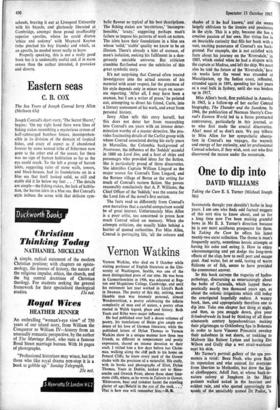Eastern seas
C. B. COX
The Sea Years of Joseph Conrad Jerry Allen (Methuen 63s) Joseph Conrad's short story, 'The Secret Sharer,' begins: 'On my right hand there were lines of fishing stakes resembling a mysterious system of half-submerged bamboo fences, incomprehen- sible in its division of the domain-of tropical fishes, and crazy of aspect as if abandoned forever by some nomad tribe of fishermen now gone to the other end of the ocean; for there was no sign of human habitation as far as the eye could reach. To the left a group of barren islets, suggesting ruins of stone walls, towers, and block-houses, had its foundations set in a blue sea that itself looked solid, so still and stable did it lie below my feet . . .' The details are simple—the fishing stakes, the lack of habita- tion, the barren islets in a blue sea. But Conrad's style imbues the scene with that delicate sym- bolic flavour so typical of his best descriptions. The fishing stakes are `mysterious,' incompre- hensible,"crazy,' suggesting perhaps man's failure to impose his patterns of work on nature. The islets have their foundations in a blue sea whose `solid,' stable' quality we know to be an illusion. There's already a hint of menace, of man's isolation, seeking his fulfilment in a dan- gerously unstable universe. But criticism stumbles flat-footed over the subtleties of this great symbolic story.
It's not surprising that Conrad often treated investigators into the actual sources of his material with scant respect, for the greatness of his style depends only in minor ways on accur- ate reporting. 'After all, I may have been a seaman, but I am a writer of prose,' he pointed out, attempting to direct his friend, Curie, into a literary assessment of his work, and away from personal history.
Jerry Allen tells this story herself, but this does not deter her from researching into Conrad's sea years with an intense deter- mination worthy of a master detective. She pro- vides fascinating details of the Carlist group with whom Conrad associated during his early years in Marseilles, the Colombia background of Nostrotno, the influence of the 'Jeddah' scandal in 1880 on Lord Jim, and a host of ships and personages who provided ideas for the fiction. She is particularly proud of three discoveries. She identifies Captain William Lingard as the major source for Conrad's Tom Lingard, and the Borneo village of Berau as the setting for much of Conrad's eastern fiction. She proves reasonably conclusively that A. P. Williams, the Chief Officer of the 'Jeddah,' was the source for the Lord Jim of the novel's first section.
The facts read so differently from Conrad's own narratives that a careful comparison would be of great interest. Unfortunately Miss Allen is a poor critic, too concerned to prove how much Conrad relied on memory. When she attempts criticism, she usually hides behind a barrier of quoted authorities. For Miss Allen, Conrad is portraying life, 'all the colours and shades of it he had known,' and she seems largely oblivious to the ironies and pessimism in the style. This is a pity, because she has a creative passion of her own. Her virtue lies in an insatiable curiosity that fills her book with a vast, exciting panorama of Conrad's sea back- ground. For example, she is not satisfied with facts about his journey on the `Riversdale,' in 1883, which ended when he had a dispute with the captain at Madras, and left the ship. We must also be told the future of the `Riversdale,' how six weeks later the vessel was stranded at Masulipatam, up the Indian coast, refloated, stranded again in 1891, spending her last years as a coal hulk in Sydney, until she was broken up in 1917.
Miss Allen's book, first published in America in 1965, is a follow-up of her earlier Conrad biography, The Thunder and the Sunshine. In 1966, the publication of Norman Sherry's Con- rad's Eastern World led to a fierce protracted controversy, particularly in this journal, as to who first made the crucial discoveries. Alas! most of us don't care. We pay tribute to Miss Allen for her sympathetic absorp- tion in Conrad's sea voyages, the warmth and energy of her curiosity, and let professional Conrad scholars, if they wish, seek out who first discovered the mouse under the mountain.


































 Previous page
Previous page